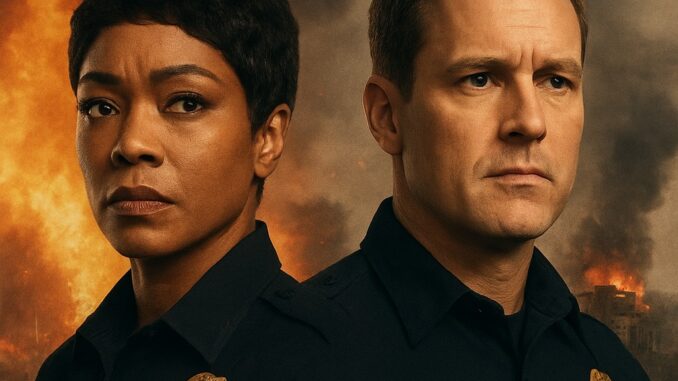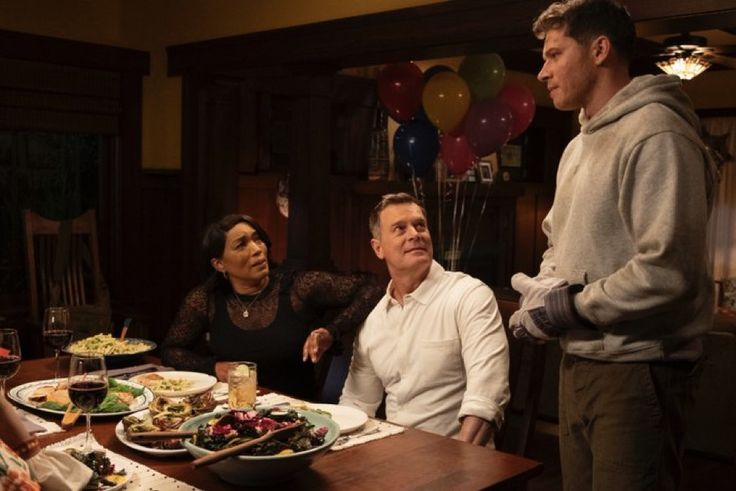
The Grand Expectations: What a Season-Opener Ought to Do
When a show like 9‑1‑1 or its spinoff 9‑1‑1: Nashville launches a new season, viewers expect a big bang. We’re talking unforgettable set-pieces, high emotional stakes, characters pushed to the limit, and a hook that keeps us coming back. The disaster opening is their signature—and historically it’s what worked. For example, past episodes of 9-1-1 feature major disasters (tsunami, broken dam, landslide) that delivered both shock and emotional payoff.
But when you raise the expectations, you raise the risk. And right now both shows seem to have mis-calculated.
What the Originals Did Right
Big Disaster, Personal Stakes
In earlier seasons the original 9-1-1 nailed the formula: huge disaster, yes—but layered with personal arcs. According to one site:
“When it really comes down to it, 9-1-1 masterfully incorporates personal ramifications into all of its biggest arcs, particularly its season openers.”
This blend is what made the opening episodes feel meaningful rather than just spectacle.
Credibility and Emotional Weight
Part of the appeal was that even when the disasters were outrageous, they felt tied to character trauma or real human stakes. The show’s own Wikipedia entry notes that season 1 got praise for how it balanced action with emotional resonance.
That credibility helps ground the chaos so the viewer cares.
The Mistake Both Shows Are Making
Over-reliance on Spectacle, Under-investment in Character
In the new premiere of 9-1-1 Season 9, we’ve got bold emergency set-pieces—yes—but some critics feel the balance is off. For example, one review says the premiere “delivers unique emergencies and sets up a space adventure” but hints at uneven tone.
Meanwhile, 9-1-1: Nashville is criticized for leaning too heavily into clichés and soapy drama—less about the disaster’s impact, more about family tension.
Losing the Hook—When the Disaster Feels Thin
For a season-opening disaster to land, it needs to feel big and meaningful. But when it just looks big, or when the stakes feel abstract or disconnected from the characters, the impact fizzles. One reviewer wrote of Nashville’s premiere:
“The first 10 minutes … tornado striking from clear sky … I stopped watching after 15 minutes.”
This illustrates how a disaster can feel unearned.
Franchise Fatigue & Re-hashing the Formula
Both shows are part of a growing franchise. 9-1-1 the original is now into Season 9. The spinoff is new, but the pattern of “big disaster” is established. When a show repeats the same “open with massive catastrophe” without refreshing how it’s done, the novelty wears off. Fan commentary reflects this:
“The season premiere episode being a series low?? That’s… not good…”
Viewers expect innovation, not just more of the same with higher stakes.
Diving Into 9-1-1 (Original) Season-Opening Issues
Season 9’s Opener—Ambition vs. Execution
The Season 9 opener attempts something bold: major emergencies, perhaps even space-related stakes. But bold doesn’t always mean effective. One review noted the show was “finally…” doing something, but the tone seemed inconsistent.
When the show swings for the fences (e.g., rockets, satellites, outer space) the risk is losing the grounded feel that originally sold it.
Character Arcs Getting Overshadowed
In the rush to set up big events, the characters may take a back seat. The core cast are supposed to be relatable first responders; when the plot gets so outlandish, the viewers’ emotional connection can get lost. The focus shifts to “what disaster happens next?” rather than “how do these characters evolve?”
Emotional Payoff Not Fully Earned
Even if the set-piece is technically impressive, if the emotional stakes aren’t built up beforehand, it can feel hollow. Reviewers of earlier disasters in the show noted how a scene worked because we cared about the people involved. Without that build-up, the opening disaster can feel like a flashy event rather than a true narrative hook.
Diving Into 9-1-1: Nashville’s Opening Mis-Steps
Too Much Soap, Too Little Firehouse
As one review puts it, Nashville “leans too heavily on clichés and soapy drama, failing to capture the essence that makes the original series.”
The tension between family drama and rescue drama is valid—but when the disaster side is undercooked, the mix feels off.
Disaster as Plot Device, Not Emotional Core
The critique: the tornado at a concert, the sudden lightning strike—it happens, but the emotional threading is weaker. In one episode review:
“The first 10 minutes … tornado … I stopped watching after 15 minutes.
When viewers feel the disaster is gimmicky rather than integral, engagement drops.
Unfamiliar Tone for Franchise Fans
Viewers of the original expect a certain tone: high-stakes, adrenaline, personal reckoning. But if a new entry in the franchise shifts too far toward character soap opera and away from the “rescue in the moment” energy, it can alienate the core audience.
Comments in fan forums reflect frustration:
“This show and the new regular 911 are terrible… only show a single 911 call operator…”
Why This Mistake Matters
Opening Episodes Set the Tone
The premiere isn’t just another episode—it’s the statement of intent for the season. If you fumble the opening, you risk diminished attention, lower viewer retention, and weaker momentum.
One source notes that 9-1-1’s early openers (“tsunami”, “dam break and landslide”) remain among the highest-rated for the series.
When the latest doesn’t measure up, it invites comparison—and critique.
Viewer Loyalty Depends on Promise Delivery
Fans of the franchise expect a certain experience: visceral emergencies, meaningful characters, edge-of-the-seat rescues. If the premiere doesn’t deliver on that promise, viewers may drift away or tune out early.
Social commentary shows the risk: listeners are vocal when they feel something is off. Example:
“Viewers appear to love the Nashville setting but feel the story premises are faulty…”
Franchise Growth Is Fragile
A spinoff like 9-1-1: Nashville has to establish itself. The original has built brand equity. If the spinoff’s opening mis-fires, it makes everything harder: building characters, getting viewers on board, proving sustainability.
In this case, commenters suggest the show is hitting franchise fatigue already.
What They Should Do to Fix This Mistake
Re-Center the Personal Stakes
Big disasters are great—but they must tie back to the characters. Ask: why does this matter to them? What emotional cost are they paying? Both shows could benefit from grounding the catastrophe in character arcs.
For example, instead of the “tornado from clear sky”, maybe show how the station is already fractured, so when chaos hits it’s personal.
Scale Back the Spectacle—Focus on Clarity
Sometimes less is more. Over-complicating the disaster (satellites, space pods, etc.) runs the risk of overwhelming. The original series succeeded when it paired spectacle with clarity of stakes. Perhaps both shows should refine what the “disaster” is before layering on the bells and whistles.

Respect the Franchise Tone While Innovating
Franchise fans expect a certain rhythm: adrenaline + heart. But they also crave freshness. The key is: new story, same emotional core. For a spinoff like Nashville, lean into what’s distinctive (setting, characters, cultural backdrop) rather than mimicking the original exactly or diverging into something entirely different.
Give the Disaster Purpose Beyond the Visual
The opening disaster shouldn’t just be “look how big this is” — it should move the story forward, reveal character, reset stakes. When it becomes a visual stunt detached from narrative, viewers disengage. That’s the trap both shows seem to be leaning into.
The Bigger Picture: Why We Care
TV Landscape Is Crowded
With streaming, spinoffs, and enormous expectations, every hour of premium TV demands more. A strong premiere is no longer optional—it’s necessary to cut through the noise.
When a franchise mis-steps at launch, the margin for error is small.
Viewer Trust Is Earned Episode by Episode
For a long-running show, viewer trust is a major asset. If you open with something that feels weak or inconsistent, that trust erodes. By contrast, a strong opening reinforces loyalty, sets a positive tone for word-of-mouth, social media buzz, and retention.
Spin-Offs Carry Extra Weight
A spin-off like Nashville has to both respect the parent brand and justify its own existence. Its premiere needs to show “yes, this is the 9-1-1 world you love” + “yes, this is new and worth your time”. If it leans too far into either, it risks being lost. And reviews suggest it’s leaning too much into soap-drama and not enough into what made the franchise distinctive.
Key Takeaways for Viewers (and the Shows)
-
When you launch your season with a disaster, make sure the characters feel relevant and the stakes feel earned.
-
Spectacle alone won’t cut it—you need emotional resonance and narrative purpose.
-
Franchise spin-offs must balance familiarity and novelty: “this is 9-1-1” + “but this is different”.
-
Viewer engagement is hardest at the start; stumbling there makes the rest of the season that much harder.
-
Critics and viewers are paying attention; fan commentary and early reviews matter for future momentum.
Final Reflection
Both the original 9-1-1 and its spin-off Nashville are navigating critical junctures. For 9-1-1 Season 9, the ambition is high—but there’s risk that in chasing bigger disasters, it loses what made it resonate. For Nashville, the challenge isn’t just launching—it’s launching well, within the brand, but with enough distinctiveness to matter.
The mistake they share? Focusing on how big the disaster is rather than why it matters. In the world of high-stakes rescue drama, that difference is everything.